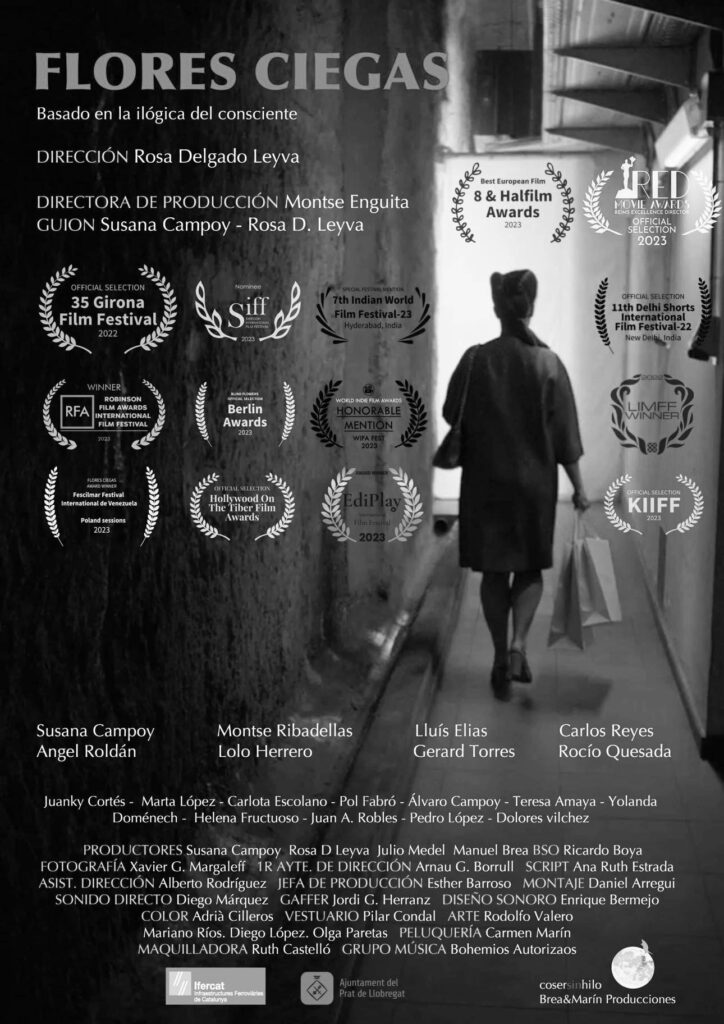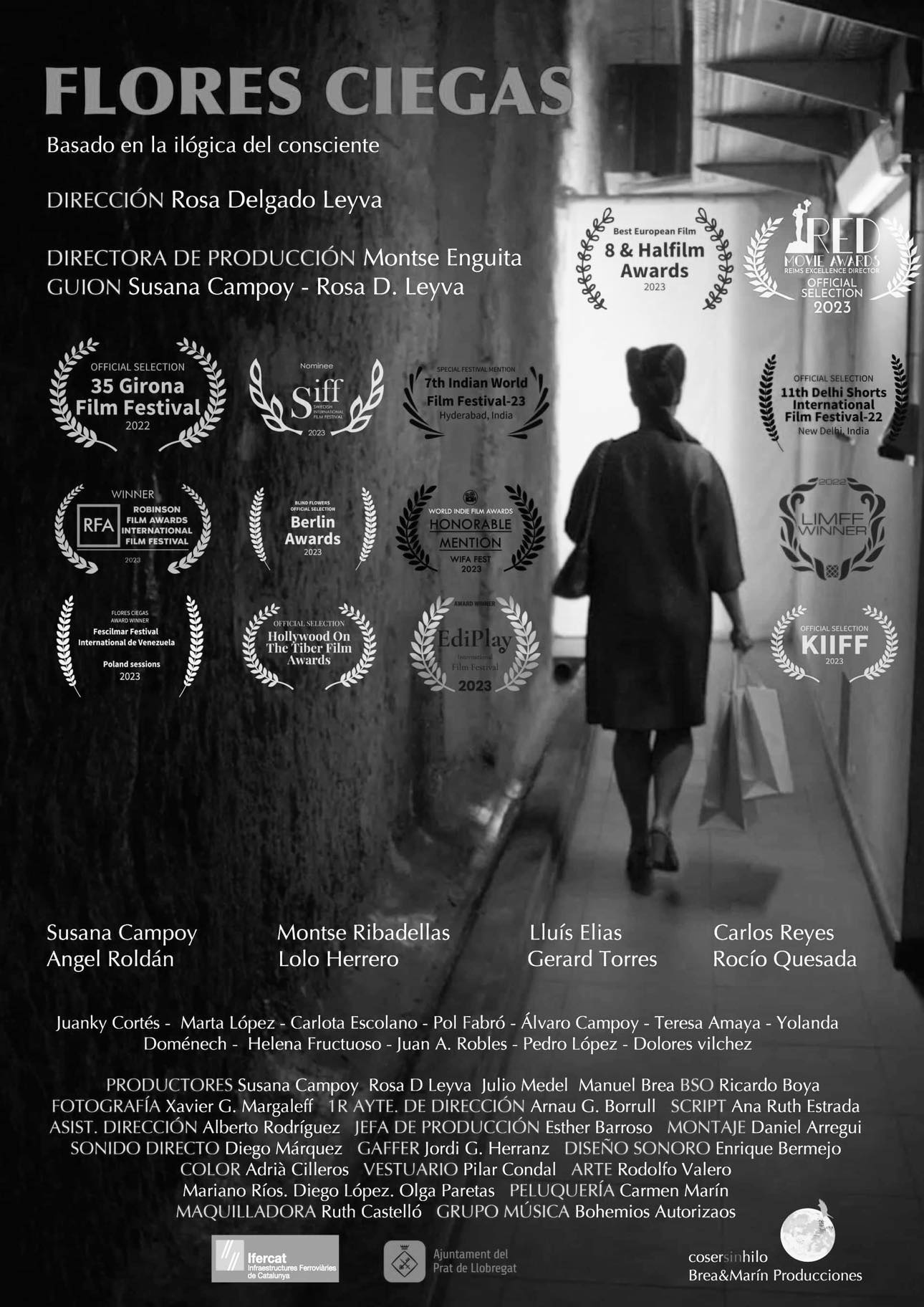
-Who is Rosa Delgado Leyva?
Multidisciplinary artist, teacher, writer and director of cinema. She was born in Barcelona and lives in the city of El Prat de Llobregat. She grew up in her mother’s hairdresser and learned the job helping her mother on Saturdays. From the age of 18 she combines too her studies with other jobs, as stewardess. Her passion for arts, painting and photography led her to a degree in Fine Arts, specializing in photography, cinema and video at the University of Barcelona. She doctored in Audiovisual Image and is author of the cinema book “The Futuristic Screen (Méliès-Chomón)” ed. Cátedra. Madrid 2012, focusing her thesis on the futurist imaginary represented in primitive and classic cinema. She is a high school teacher of draw, audiovisuals… since 2000 and film director of two main short films, the second Blind Flowers (2022) is now circulating around festivals, and the previous one, Oh the Chacho well he knows (2017) won numerous awards and recognitions in Latin America, Cannes, Berlin, Austria…, and especially in Italy. She hopes one day can get a feature script out of the drawer.

-What inspired you to become a filmmaker?
When I was studying the second year of technical architecture in Barcelona, there was in the same building a dark room for developing black and white photography. The director of architecture asked us if we wanted to learn it. A group of students enrolled in the course. But we needed a reflex camera. It coincided that I received my first salary and I spent it entirely to buy one. I enjoyed that experience so much that I decided to change studies to Fine Arts to specialize in photography, cinema, and video. So, the origin of to become a filmmaker comes from my passion of the analogy photography in black and white.

-Do you think the cinema can bring a change in the society?
The relationship between art and society has always gone in both directions throughout history. Cinema offers the possibility of uniting, in a certain way, all the arts in a global and choral format, which makes it to have a power of communication and excite more directly and expanded to the public. The themes in cinema drink from society constantly, welcoming arguments from it and turning them again from subjective perspectives that are then interpreted freely by audience. I believe that cinema contributes to changes through these multiple individual interpretations that when they interfere together can be reflected, besides to the posterior cinema, in many other areas of humanity, such as education, the environment, immigration, the economy …, cinema can influence even music, fashion, other arts and stiles of life… They are small individual changes that, as if by contagion, are going defining the general changes in the society. And the independent cinema, here, has their own words to express, own visions since the free individual’s perspective out the frame, without the contamination of the interests of the markets that focus their investments, forcing a corseted way of creating, thought only on generating box office sales. In my opinion, the independent cinema is the most capable of changing the course of things.

-What would you change in the world?
I would change too many things. In this sense it is easy to give up out of helplessness. I value all those who strive to express themselves in this medium without help. If we don’t enter festivals everything stays at home, but we must not get frustrated, we must keep trying. There is a premise superior to everything, respect for the other, it doesn’t main wherever the person is born, whatever their family, our society must be able to give the same opportunities to everyone.
When I was a child, my teachers told me that in the past civilizations fought for territories and wealth of others, they entered wars to reach them, but all that was already part of the past, at less in occident world, because we had evolved. Apparently, they never thought, and I less that in the twenty-first century we had to revive the barbarism. I recommend you to watch the movie “Things to come” by William Cameron Menzies (London, 1936), written by H. G. Wells, if they woke up now…!!! Or pay attention to the final scene of 2001, where the protagonist character is in a bed in his last moments of live contemplating classic art in a cosmic room; perhaps our wise people of the past have something to announce to the future, seems that we have done something wrong, and for this the main character turn to born again, to bring a better world, to give another opportunity to the civilization. But we haven’t learned. So difficult is live in peace? So, I would create a world government that would be responsible for preventing any war and maintaining peace in all the planet. Surely, they were going to have a lot of work!!
–Where do you see the film industry going in the next 100 years?
Cinema can unite all the diversity and multiplicity of civilizations from end to end of the world, today, thanks to new globalizing technologies. There is a barrier to break, the south cannot continue to look at the northern hemisphere as paradise, because it is not. And the North cannot continue to look at the southern hemisphere as poor submissives to an uncertain future that leads them to emigrate through seas of death following the false dreams that the northern screens sell them. I see a future where the cinema independent and territorial cinema can show their visions and individual perspectives to the world. After covid the festivals have survive thanks to online platforms, and now they try to return to alive screenings where the physical experience allows meet people again. The contact, to meet people of all parts of the planet and live this experience can’t bellow only to the elite festivals… We have a mission, to be possible people around world who make independent cinema can the option to express, meet togethers, learn one’s to the others. When the industry of music arrives to the houses by internet, alive concerts had a success explosion. With the cinema, the future will be, by one hand, the technology immersive, including touch and smell in movie theatres, this is what the industry of Hollywood I think will follow to persist. But by other hand, the future will be in the meeting festivals alive, the same has successes with the concerts. Physical events where the culture of cinema offers knowledge that foster rich relationships between people. While the commercial industry will invest to offer an increasingly immersive cinema, trying to practically copy real life, perhaps public administrations, even, will join in offering a live cinema culture with more creativity. I think the organizing members of all kinds of festivals, independent filmmakers, producers, technicians, actors, actresses…, it will play an important role in the future society. Because the path of television platforms is already conquered, it has become a video store and does not have much more to go, it will continue to live with other roads that will still walk. The humanity of the future, in my opinion, can get tired of so much individual screens and virtual world, and there will come a time when sharing real encounters will be greatly appreciated. And the opportunity to live these experiences should not belong only to the famous elite of cinema.

